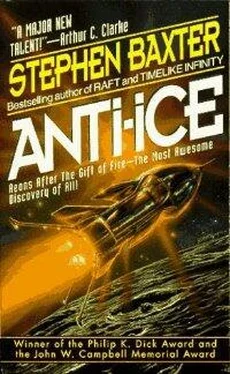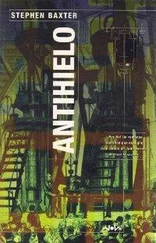Stephen Baxter - Anti-Ice
Здесь есть возможность читать онлайн «Stephen Baxter - Anti-Ice» весь текст электронной книги совершенно бесплатно (целиком полную версию без сокращений). В некоторых случаях можно слушать аудио, скачать через торрент в формате fb2 и присутствует краткое содержание. Год выпуска: 1993, ISBN: 1993, Издательство: Collins, Жанр: Фантастика и фэнтези, на английском языке. Описание произведения, (предисловие) а так же отзывы посетителей доступны на портале библиотеки ЛибКат.
- Название:Anti-Ice
- Автор:
- Издательство:Collins
- Жанр:
- Год:1993
- ISBN:978-0-246-13835-4
- Рейтинг книги:5 / 5. Голосов: 1
-
Избранное:Добавить в избранное
- Отзывы:
-
Ваша оценка:
- 100
- 1
- 2
- 3
- 4
- 5
Anti-Ice: краткое содержание, описание и аннотация
Предлагаем к чтению аннотацию, описание, краткое содержание или предисловие (зависит от того, что написал сам автор книги «Anti-Ice»). Если вы не нашли необходимую информацию о книге — напишите в комментариях, мы постараемся отыскать её.
Anti-Ice — читать онлайн бесплатно полную книгу (весь текст) целиком
Ниже представлен текст книги, разбитый по страницам. Система сохранения места последней прочитанной страницы, позволяет с удобством читать онлайн бесплатно книгу «Anti-Ice», без необходимости каждый раз заново искать на чём Вы остановились. Поставьте закладку, и сможете в любой момент перейти на страницу, на которой закончили чтение.
Интервал:
Закладка:
We sank into the lunar landscape. Tumbled mountains rose around us, and wisps of dust fled from beneath us, agitated by the nearness of our rocket nozzles.
I began to believe I might live through this.
The sound of the rockets, which had been a steady, deep-chested roar, now coughed uncertainly and died away. I turned with a wild hope. Were we down? Then I stared at my feet, for, to my horror, they were leaving the deck. “Traveller!” I screamed. “I am floating once more!”
“Our fuel is gone, Ned,” he said calmly. “We are falling freely toward the lunar surface. I have done my best; now we can only pray.”
The lunar landscape rushed to meet us, tilting.
A thousand questions washed through my mind. How far had we been from the surface when the engines failed? And how quickly would one accrue speed, falling through the Moon’s enfeebled gravity? What size of impact could the Phaeton withstand before she split open like an egg and tumbled us all, warm and soft and helpless, out on to the cruel lunar rocks?
There was a grind of metal on rock.
I was hurled to the deck once more. I heard a smashing of glass, a ripping of cloth and leather. The deck tilted crazily, and I slid along it for several feet, fetching up at last against a bank of instruments. Then the deck came back to a level. I pressed my face to the riveted floor, waiting for the moment when the hull burst and the air was sucked for the final time from my lungs…
But the noise of our impact died away; the ship settled a little further into whatever rocky cradle it had carved for itself. A great hush fell over the craft. But there was no rush of air, no more tearing of metal; I was still alive, and breathing as comfortably as I ever had.
I climbed slowly to my feet, mindful of the weak lunar gravity. Traveller stood on his couch, abandoned restraints coiled around his feet; with hands on hips and stovepipe hat fixed jauntily in place, he peered out at his new domain.
I climbed up beside him, with little effort; I saw how his frock coat had been torn down the back, and how blood seeped steadily down his wrinkled cheek from a cut to the temple.
A city of rock lay all around us. Shadows fled from a Sun which was barely hidden behind a distant peak. The place was airless, desolate, utterly forbidding of human life—and yet conquered.
“Dear God, Traveller, you have brought us to the Moon. I could compliment your skill as a pilot, your genius as an engineer—but surely it is your sheer nerve, your audacious vision, which shines out above all.”
He grunted dismissively. “Pretty speeches are for funerals, Ned. You and I are very much alive, and we have work to do.” He pointed to the Sun. “Another six to eight hours, I should say, and that Sun will be hidden behind the spire, not to reappear for a full fortnight, and we shall slowly but surely freeze solid. We need water, Ned; and the sooner we get out there and bring it in the sooner Pocket can brew us a healthy pot of tea and we can set off for Mother Earth!”
Despite the feebleness of the gravity I felt as if I should fall, so weak did every one of my joints become. For once more Traveller had looked ahead in a manner which evaded me. Even if bucketfuls of precious water lay just behind those rocks over there, one of us would have to leave the craft and fetch it in. And I knew that could only be me!
10
AN ENGLISHMAN ON THE MOON
Traveller unfurled a rope ladder and we rejoined our companions in the Smoking Cabin. There we found an atmosphere of euphoria, aided by the deck’s noticeable tilt which leant an air of enchantment to the proceedings. Traveller and his manservant settled down to opening up the access to the lower compartment of the craft. The sullen Bourne was staring out of the windows at the tumbled lunar landscape. Holden was bounding about the Cabin; with whoops of pleasure he launched himself five or six feet into the air before settling back to the deck, as gentle as a rotund autumn leaf. I could not help but smile at the crimson glow of his face. “My word, Ned, these lunar conditions are enchanting; it’s exactly like being a child again,” he said.
Holden was all for breaking out the brandy and celebrating our successful conquest of the Moon, but Traveller would have none of it. “There is no time for frivolities,” he admonished the journalist. “This is not a picnic; we have a few hours in which to win the struggle for our very survival.” He looked at me with something resembling concern—although he might have been regarding some fragile but vital component of machinery. “Ned, your comfort is of the essence now. Would you care for some tea, or even a light meal, to fortify yourself before your adventure?—and I would strongly recommend, as before, purging your system before venturing from the craft. Pocket!”
And so it was that I, surrounded by my companions and sitting in a comfortable chair, bit into sandwiches of cucumber and tomato and sipped a blend of the finest Indian teas—while all around me the desolation of the Moon, lifeless and cold, stretched to the horizon!
Though I tried, I found it impossible to purge my bowels as Traveller had recommended.
Then, all too soon, I was climbing once more into the stinking confines of Traveller’s leather air suit. The hose which brought air to the suit—and which I had severed during my perilous entry into the Bridge—had been repaired by Pocket. Traveller and the others assembled items of equipment. I was given a length of rope to knot around my waist, a small electrical lantern improvised from one of the Bridge’s lesser instruments, and an ice pick made from Traveller’s stock of spare parts. Traveller rigged up a bag from the oilcloth which had once covered the floor. This bag, a substantial affair about four feet wide, was double-walled, and between the walls of cloth Sir Josiah inserted cushion stuffing. This satchel was intended for me to lug water ice about the lunar surface, and, said Sir Josiah, the purpose of the stuffing was to provide the precious substance with some protection from the rays of the sun.
I fixed the axe and lamp to my waist, so as to leave my mittened hands free for my climb down to the surface, and suspended the bag by two straps from my back in the manner of an outsize knapsack.
Holden began to argue that the significance of the moment—man’s first steps on the surface of another world—was such that I should spend some time on some form of ceremonial.
“Out of the question,” Traveller snapped. “We don’t have time for such nonsense. Ned is going out to save our lives, in conditions of severe hazard; not to stand on his hands and do tricks for the King.”
Holden bristled. “Sir Josiah, despite the importunate nature of our journey, we have nevertheless succeeded in landing where no explorer has arrived before. And we therefore have the duty to claim this lunar continent in the name of the Empire. I would remind you that young Ned is a representative of His Majesty’s government. Perhaps the raising of the Union Flag over the dust of the Moon—”
Bourne barked short laughter. “How like you British that would be. How obscene to desecrate such a place with your ugly flag.”
Holden drew himself up, thrusting his pot belly out before him. “The very objections of the Frenchie, Sir Josiah, show that such a course would be eminently suitable.”
Traveller had been working at my suit seals. Now he straightened up and rested his hands on his hips, leaving me and Pocket to struggle alone. “Holden, I have never listened to such asinine balderdash. I have two objections. First, thanks to the airlessness of the lunar surface, there would be no wind to support your flag. It would hang for all eternity, limp and helpless; is this a suitable symbol of the Empire? Of course we could prop it open with some sort of crutch—a metal rod, perhaps…” He laughed. “Who but the most pompous ass would consider such a course? And in any event, my second objection is rather more conclusive: it is that I do not carry flags of any description on this craft; not the Union Flag, not the tricolore, not any nation’s flag. So unless you are a nimble seamstress, Mr. Holden, I suggest your ambition will remain unfulfilled.”
Читать дальшеИнтервал:
Закладка:
Похожие книги на «Anti-Ice»
Представляем Вашему вниманию похожие книги на «Anti-Ice» списком для выбора. Мы отобрали схожую по названию и смыслу литературу в надежде предоставить читателям больше вариантов отыскать новые, интересные, ещё непрочитанные произведения.
Обсуждение, отзывы о книге «Anti-Ice» и просто собственные мнения читателей. Оставьте ваши комментарии, напишите, что Вы думаете о произведении, его смысле или главных героях. Укажите что конкретно понравилось, а что нет, и почему Вы так считаете.












